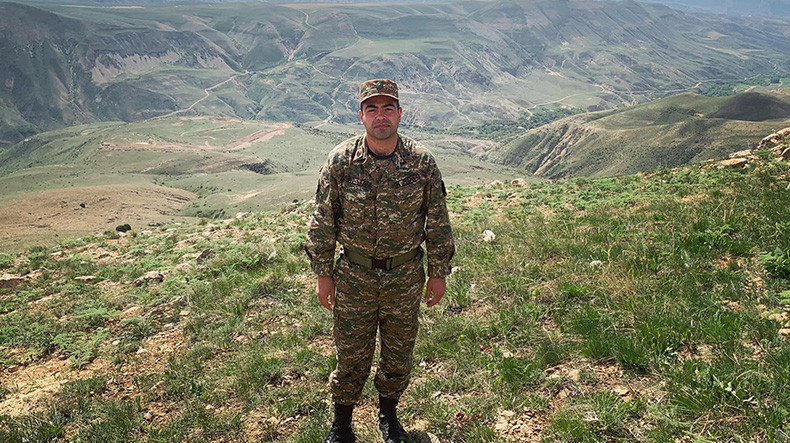
Military doctor Aghasi Papikyan: Every soldier’s life was priceless, they had to be saved
After graduating from the Faculty of Military Medicine of the Yerevan State Medical University, Aghasi Papikyan enlisted in the military unit of Vayk. He was appointed head of the military medical unit almost a month before the war in Artsakh in September 2020.
September 27 did not portend anything unusual, but at dawn the terrible news of the war was delivered. The preparations began immediately. Aghasi left for Artsakh on October 6. From the very beginning he realized that this was a completely different war.
The military doctor was stationed in Jrakan, at the Vorotan and Davit Bek section, for more than a month. From the very first moment, they started to evacuate the wounded from the frontline. His thoughts were with his friends who were serving in Artsakh at that time. Even today he tries not to talk about his experiences, because during the war he lost friends, who are always in his heart and thoughts.
Providing medical care under incessant shelling
(3).jpg)
At first the sounds of the explosions were unusual, but over time they became commonplace. Agasi admits that throughout the war, sometimes even during bombardments, they tried to joke, otherwise they would have gone crazy. Now he wonders how they managed it.
"We didn't always know where we were going, what we might encounter, but when we were informed that there were wounded soldiers in a given area, we set out to evacuate them at all costs. We didn't even leave wounded men who had no chance of survival on the battlefield. Otherwise I would have never forgiven myself," Papikyan tells Panorama.am.
Today the doctor recalls with a heavy heart how once more than 10 bodies were retrieved from the ground.
"It's terrible when you realize that they were your peers, young men who had dreams and wanted to live," he says.
During the war, he states, doctors did the impossible. Every soldier’s life was priceless and they had to be saved.
"During the whole war, when we were removing the wounded from the frontline on my car, there was only one case when we did not take a soldier to the hospital. He had multiple injuries and was bleeding. We did not have time to save him, but the others we moved to the hospital were saved," says the military doctor.
During the 44 days of fighting the ambulances often came under Azerbaijani artillery fire. Doctors rushing to the aid of the wounded could not be sure whether they would make it across that road or not.
Aghasi Papikyan recalls there were cases when the enemy deliberately hit the ambulances, not allowing them to get closer to the wounded. At that time, they had to hide in trenches and wait for the shelling to stop in order to get to those who needed help.
That soldier also survived…
Remembering the days of the war, the doctor is sometimes silent for a long time. After some pause, he starts talking again.
"One day the shooting stopped and we tried to rest. We were talking to one of the doctors when I saw two stars falling from the sky.
I told him, “I have never seen two stars falling at the same time”. Subsequently, there was a loud explosion, heavy artillery fire began. The soldiers next to us were wounded, the guys were begging for help. We tried to approach them, but the shelling would not stop. After waiting a few minutes, we ran towards the soldiers despite the shooting. I will never forget the look in the eyes of one of them, he just wanted to live... That day we had 7 casualties, and managed to take 10 wounded to the hospital. That soldier also survived...".
Grieving for the loss of his friends
(2).jpg)
The military doctor admits it's not that they were fearless during the war, but he felt it for a day or two. He says that if he had let fear get the better of him, he would not have been able to work.
"During the war I didn't cry at all, I cried later when visiting the graves of my friends. Sasha Rustamyan, Narek Melikyan, Garik Manukyan, who served in the Jrakan (Jabrail) military unit, are always in my heart,” he says.
The doctor notes that the pain does not subside, but the following thought gives him strength: "Whatever we did was for the sake our country, we did not do it to be praised later. We have to live in a way to be worthy of those who fell.”
“We have to work as hard as we can. We have a homeland to take care of, love and defend. We must always support the army with our work, and be useful to it in every possible and impossible way," Papikyan says.
Like many others, he states during the wartime the medical community was united. They tried to keep in touch 24 hours a day to help each other, because every second could cost the life of a wounded soldier. Even after the war, he underlines, it is necessary to unite, because only with joint efforts it is possible to get the country out of the current situation.
(1).jpg)
.jpg)
Photos from Aghasi Papikyan's personal archive
Newsfeed
Videos






























